Toy Fox Terrier
Canis lupus
Hunters use the toy fox terrier to go into a fox's den and flush the animal out.
Advertisement
Toy Fox Terrier Scientific Classification
- Kingdom
- Animalia
- Phylum
- Chordata
- Class
- Mammalia
- Order
- Carnivora
- Family
- Canidae
- Genus
- Canis
- Scientific Name
- Canis lupus
Read our Complete Guide to Classification of Animals.
Toy Fox Terrier Conservation Status
Toy Fox Terrier Facts
- Fun Fact
- Hunters use the toy fox terrier to go into a fox's den and flush the animal out.
- Temperament
- Intelligent, friendly, alert, playful, loyal, spirited
- Diet
- Omnivore
Toy Fox Terrier as a Pet:
- General Health
- Energy Level
- Shedability
- Trainability
- Intelligence
- Tendency to Chew
- Size
- Family and kid friendliness
- Yappiness / Barking
- High
- Hypoallergenic
- Yes
- Separation Anxiety
- High
- Preferred Temperature
- Average climate
- Exercise Needs
- High
- Friendly With Other Dogs
- Poor
- Pure bred cost to own
- Up to $1,000
- Dog group
- Terrier
- Male weight
- 10-13 lbs
- Female weight
- 9-12 lbs
This post may contain affiliate links to our partners like Chewy, Amazon, and others. Purchasing through these helps us further the A-Z Animals mission to educate about the world's species.
View all of the Toy Fox Terrier images!
In 2003, the toy fox terrier became the 150th dog breed to be recognized by the American Kennel Club.
The toy fox terrier is a petite terrier, an amusing mix of charisma and sturdiness that belies its size.
See all of our expert product reviews.
Indeed, this dog was bred to work on farms and used as a tracker in small game hunts. But all owners would attest this dog is a funny, loving, loyal, and devoted addition to any family.
Additionally, the toy fox terrier is agile, graceful, athletic, and shows great stamina. Take note that this dog has all the energy of the terrier, with the potential to use this boundless energy to bark, dig and investigate.
The toy fox terrier needs plenty of exercise and loves dog sports like rally and flyball. Since the breed is intelligent and learns fast, these dogs are easily bored and can be particularly stubborn.
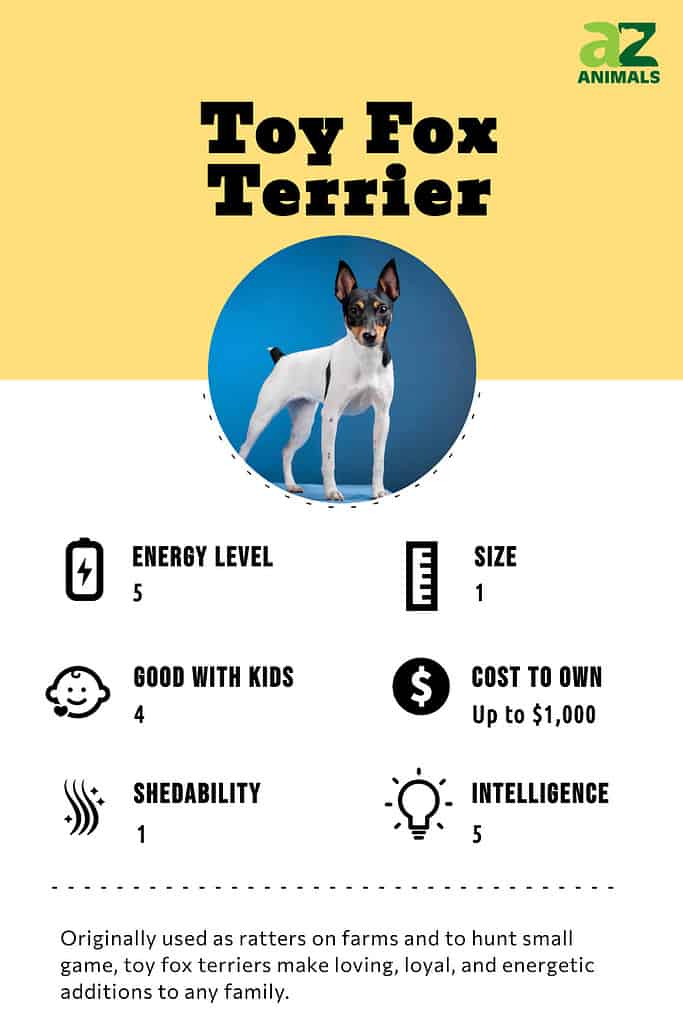
Evolution and Origins
The toy fox terrier, often shortened to TFT and also known as the American Toy Terrier and Amertoy, is one of the few dog breeds wholly originating in the U.S. In the early 1900s, breeders crossed the smallest smooth fox terriers with a variety of toy breeds, including the Italian greyhound, miniature pinscher, Chihuahua, and Manchester terriers, to create a smaller terrier mix with a less fierce temperament.
These toy fox terriers were originally used as ratters on farms and to hunt small game. Due to their small size, agility, and intelligence, these dogs became popular in traveling circuses doing acrobatics, walking tightropes, and performing various tricks. The same traits mean they are excellent competitors in obedience and agility trials, rally, and flyball today.
Health and Entertainment for your Toy Fox Terrier
See all of our expert product reviews.
In 1936, toy fox terriers were recognized in the Terrier Group by the United Kennel Club. It took until 2003 for them to be recognized by the American Kennel Club in the Toy Group.
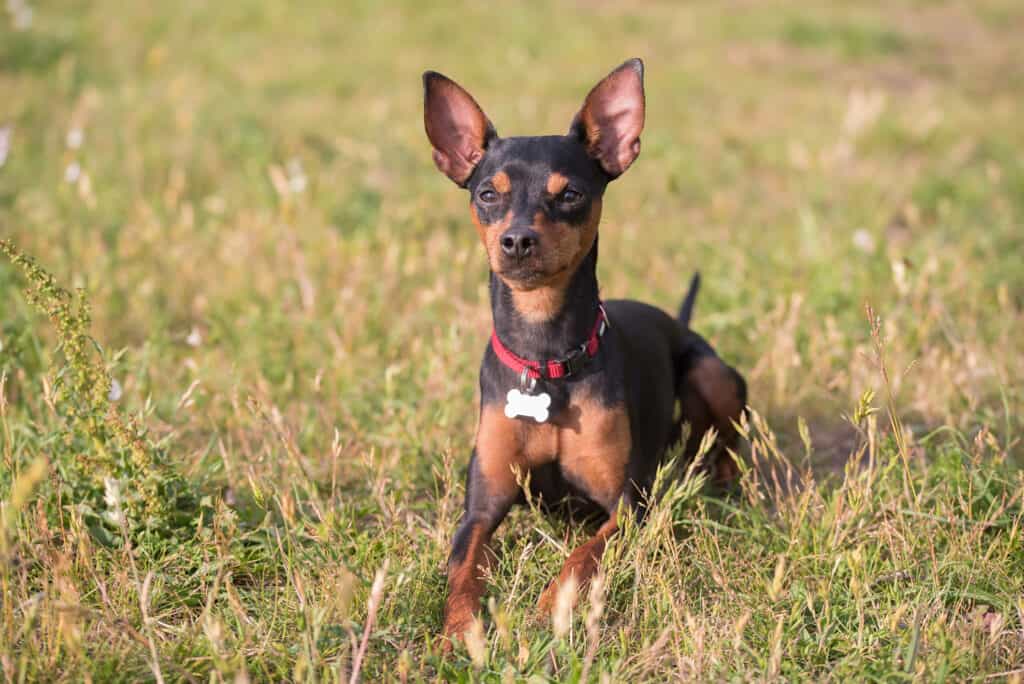
Miniature pinschers are one of the breeds crossed with the
smooth fox terrier
to develop the toy fox terrier.
©iStock.com/sssss1gmel
Different Types of Toy Fox Dogs and Toy Fox Mixes
In several ways, the toy fox terrier and miniature fox terrier are quite similar. They are both easy to train and playful. Both doggies are loyal, gentle, and affectionate when it comes to their families. Other dogs that are similar are the Chihuahua, miniature pinscher, and Italian greyhounds.
The toy fox terrier is a parent in the breeding of the wire (or wiry) fox terrier.
3 Pros and Cons of Owning a Toy Fox Terrier
The toy fox terrier can come in a mix of brown and tan colors. This dog is fearless, playful, and pretty darn silly. Puppies can also have that stubborn terrier temperament. For the record, here are some other pros and cons of the toy fox.
| Pros! | Cons! |
|---|---|
| Lovable, loyal, playful, entertaining The toy fox terrier loves attention and to please — despite that stubborn streak — and will put a lot of effort into it. This dog is not hard to please. Give this breed the room it needs to play. Or better yet, play or snuggle with the pup. | Retains less-beloved terrier characteristics This dog will dig up your garden, claw, and chew at shoes and children’s toys. It has a strong prey drive, which means it goes running after all kinds of animals. |
| Minimum grooming required This is a great mix breed if you don’t want to put in the work required of a hairier or bigger canine. With its tight coat of hair, you won’t have to worry about shedding. That makes this dog an excellent hypoallergenic pet choice. | Noisy barker This is a vocal pooch. To the point of distraction. To avoid this, put in the work. Your dog needs to learn serious social skills. Lucky for you, this is a smart dog and as long as training’s done right, it shouldn’t be hard. |
| Easy to train and housebreak The toy fox terrier is an intelligent breed. While it’s not impossible to train an adult, it’s better if you get the dog trained as early as possible. The older dog will be set in its ways. | Not necessarily a lap-dog Despite its diminutive size, the toy fox doggy is one physical pup that needs plenty of exercise and enrichment. It’s a snuggler and has no problem sitting in a purse or bag, but is just as likely to go running off in search of adventure. |

The toy fox terrier loves attention and is loyal and eager to please.
©everydoghasastory/Shutterstock.com
Size and Weight
The toy fox is a tiny little thing but tends to be fairly muscular and sturdy. Height-wise, the females tend to be in the 10- to 13-inch range, while the male is between 11 and 14 inches. As for weight, it’s 10 to 13 pounds on average for males and 9 to 12 pounds for females.
| Height (Male) | 11 to 14 inches |
| Height (Female) | 10 to 13 inches |
| Weight (Male) | 10 to 13 pounds |
| Weight (Female) | 9 to 12 pounds |
Common Health Issues
In general, the toy fox terrier is in pretty good health. Any disease the dogs are prone to is more something an owner should be aware of as opposed to being worried about.
Therefore, if you buy a puppy, see if your breeder or rescue can produce health clearances for the parents. Because these papers are evidence the puppy’s cleared of a particular condition. Careful breeders screen for genetic and breed-only diseases.
For example, here are common diseases that are genetic to the toy fox terrier lineage:
- Demodectic Mange
- Patellar Luxation
- Legg-Calve-Perthes Disease
- Von Willebrand Disease
- Congenital Hypothyroidism with Goiter.

If you buy a puppy, see if your breeder or rescue can produce health clearances for the parents.
©Kuvatoive/Shutterstock.com
Temperament
At heart, the toy fox terrier is curious and capable of spending hours exploring outdoor spaces, your cabinets, and tiny hidey-holes you didn’t even know existed. This dog loves people, games, and playing with toys. The breed is an excellent companion for older children, but beware, the toy fox mix doesn’t tolerate mishandling.
This terrier is energetic and likes to show off and will play for hours, take a rest snuggling in your lap and rush off for the next adventure. Unlikely to warm to strangers right away, the puppies make for an exceptional family or one-person pet. Alert and inquisitive, this species holds onto a young spirit throughout its lifespan.
This is a happy dog that promises to bring great joy to the home. But it has strong pack instincts. Human behavior will influence it. So, you have to establish your role as a leader with confident, firm, and consistent behavior. Include all family members in behavior modification.

Toy fox terriers have strong pack instincts, so you have to firmly establish your role as a leader.
©iStock.com/Farinosa
How to Take Care of a Toy Fox Terrier
Get ready to accommodate your toy fox terrier’s huge personality. It will be a challenge from time to time. While this pooch is a great watchdog and loyal to an almost fiery intensity, avoid encouraging his protective nature as it can turn into guarded behavior and trust issues.
Make sure this dog gets tons of exercise as it’s a lot more energetic than its size indicates. Take your toy fox terrier out for walks or with you on jogs, as this dog is an agile competitor and will give you a run for your money on hikes.
If you plan to have another animal, learn how to introduce new pets to your dog. Toy fox terriers love to chase smaller creatures, though are not afraid of bigger ones. You’ll need firm recall commands or to keep them leased to control temptation.
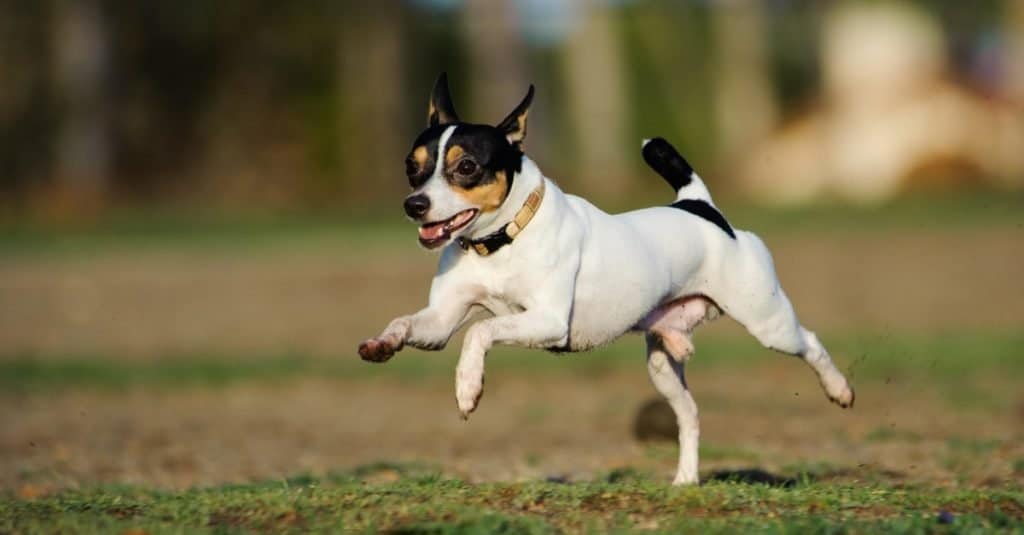
Make sure your toy fox terrier gets tons of exercise as it’s a lot more energetic than its size indicates.
©everydoghasastory/Shutterstock.com
The Best Dog Food for Toy Fox Terriers
The diet should be appropriate for a dog’s age. There are diets for puppies, adults, and seniors. Food can be high-quality, commercially manufactured dog food or a vet-approved home meal. There is human food that’s safe for your toy fox but let your vet advise you.
Treats will be an important training aid but avoid relying on them. And make sure your dog always has access to fresh, clean water.
A-Z Animals believes the best dog food for Toy Fox Terriers is Merrick Lil Plates Small Breed Dry Dog Food with Real Meat.
Firstly, we like how the lamb, chicken, and wholesome grains come together in a satisfying meal that supplies top-notch nutrition like glucosamine and chondroitin for surefire joint protection. Additionally, omega-3 and omega-6 fatty acids have a lot of benefits, including nourished skin and coat.
Check Chewy and Amazon for this product.
- Real lamb and brown rice small dog breed recipe
- Glucosamine and chondroitin for healthy hips and joints
- Probiotics and prebiotic fiber supports healthy digestion
Maintenance and Grooming
The dog’s coat will be fine, short, and smooth. Mostly white with highlights that can be brown, black, tan, or chocolate. Brush him carefully to remove dead hair. The dog is pretty much hypoallergenic and non-shedding, but brushing is good for keeping his coat healthy and clean.
Trim your toy fox terrier’s nails two times a month. Long nails are a risk to dogs and can lead to physical pain. If they click, the nails are too long. Remember, you’re trimming, not cutting. You can cause bleeding as dogs’ nails have blood vessels.
Check ears regularly for odors or redness. This indicates an infection. If you see these signs, wipe your dog’s ears with cotton balls dampened in pH-balanced ear cleaner. Never insert anything into the ear. Clean the outer area.
Get puppies used to having you examine and brush their teeth. As you groom, keep an eye out for rashes, sores, and other inflammatory conditions. Along with regular visits to the vet, keep your eye out for possible health issues.

To keep a toy fox terrier healthy, check your dog’s ears regularly for odors or redness.
©iStock.com/Farinosa
Training
Early training and socialization for puppies help ensure your toy fox terrier ends up a well-mannered canine. This dog is highly intelligent and ready to learn under the proper conditions. Potty training can involve potty pads or simply sending the dog outside.
Toy fox terriers are adaptable, obedient, and highly intelligent. They will follow you under the proper conditions and if you use a firm but kind hand.
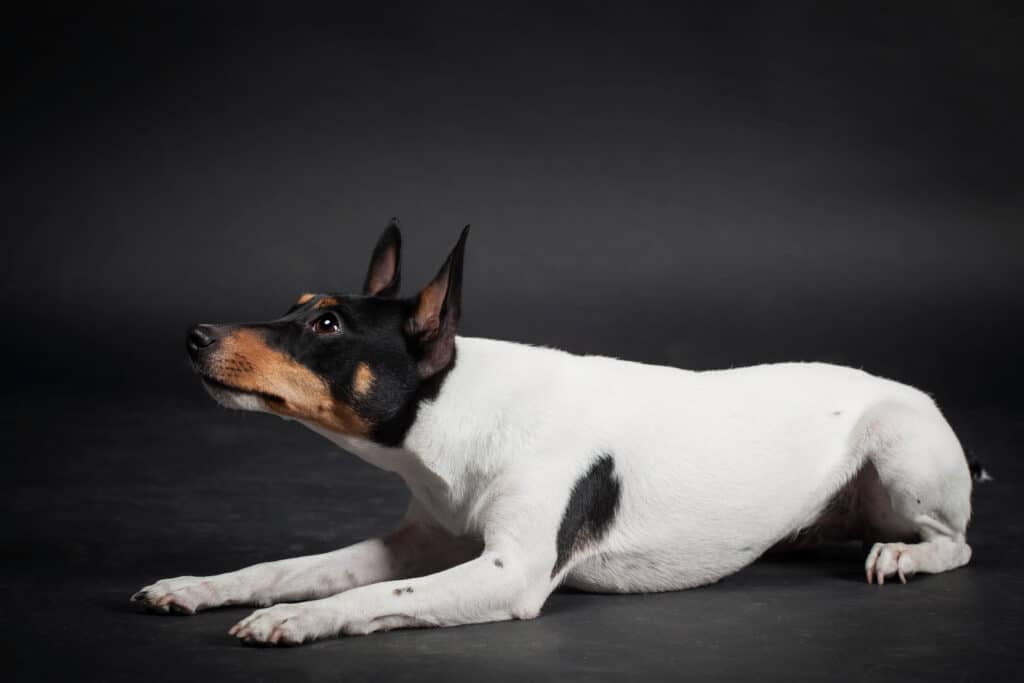
Toy fox terriers are highly intelligent and ready to learn under the right conditions.
©iStock.com/Farinosa
Exercise
These dogs are natural athletes and have the energy to burn. They love to romp and run, walk, or hike. It wouldn’t be unusual to find them running laps in larger areas of the home.
Play will be important but won’t fulfill the toy fox terrier’s need to walk. Get your dog out daily for a supervised 30-minute walk. Your pup will also appreciate a runaround in an open, safe area, like a dog park or fenced-in yard.
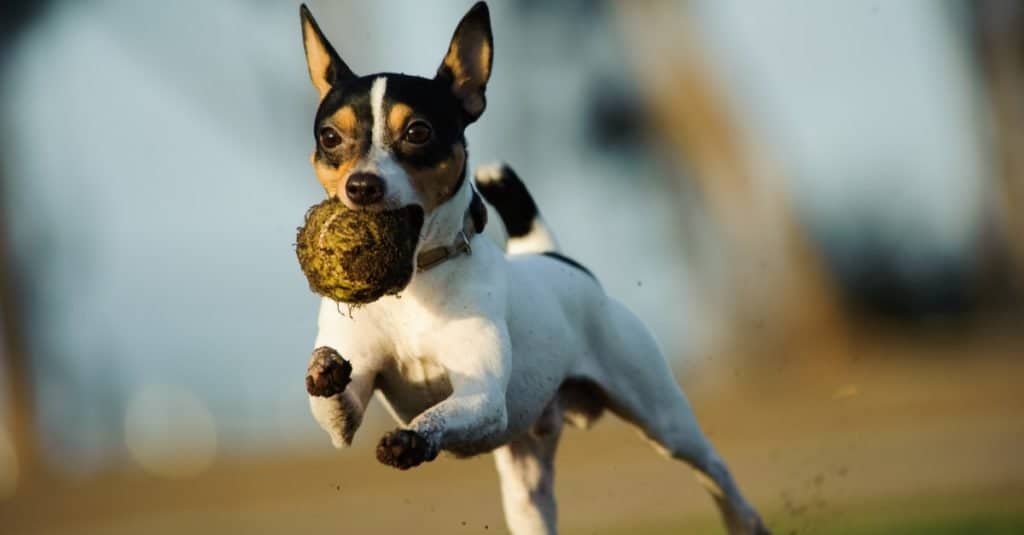
Toy fox terriers are natural athletes and love to romp and run.
©everydoghasastory/Shutterstock.com
Puppies
You can’t undervalue the importance of locating a reputable breeder when searching for toy fox puppies. It greatly improves the chances of getting a well-socialized and healthy dog. A good place to start is the American Toy Fox Terrier Club. You can also reach out to a unique rescue like the Toy Fox Terrier Rescue.

A reputable breeder greatly improves the chances of getting a well-socialized and healthy dog.
©dezy/Shutterstock.com
Toy Fox Terrier and Children
Toy fox terriers can be wonderful companions for older children. They are not recommended as playmates for younger children. A brown, tan, or chocolate toy fox has a small size and a tendency to easily break its bones. The very young can be aggressive. The combination makes for a potentially bad outcome. Plus, the dog doesn’t deal with mishandling gracefully.

A brown, tan, or chocolate toy fox has a small size and a tendency to easily break its bones.
©dezy/Shutterstock.com
Dogs Similar to Toy Fox Terriers
If you have an interest in canines like the toy fox terrier, here are three other breeds you can consider.
- Fox Terrier — The fox terrier is famous for its intelligence and humor. They have tons of personality and their grace makes them excellent show dogs.
- Rat Terrier — Rat terriers are affectionate and loyal members of the family. They’re bred as working dogs and are good choices for active families with large, fenced-in areas to burn energy.
- Chihuahua — The tiny chihuahua is bold to the point of brazen. Highlights of its unique appearance include its large ears and big eyes.
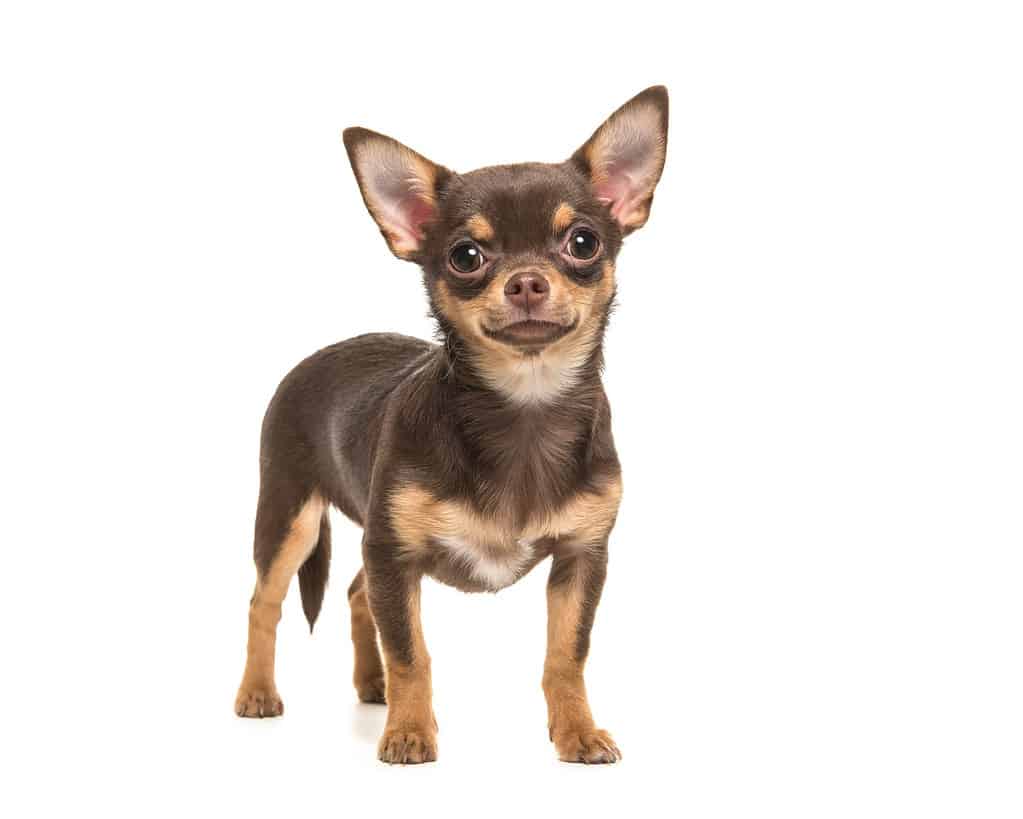
The chihuahua is a bold breed that is similar to the toy fox terrier.
©MirasWonderland/Shutterstock.com
Popular Names for Toy Fox Terriers
Here are popular names for the toy fox terrier include:
- Riley
- Tootsie
- Puddles
- Lucky
- Buddy
- Charlie
- Toby
- Middy.
Toy Fox Terrier FAQs (Frequently Asked Questions)
What is a toy fox terrier?
Toy fox terriers are smaller versions of the smooth fox terrier. Like most of the terrier breeds, these dogs are loving and devoted companions.
Are toy fox terriers good family dogs?
With proper socialization and training, they will make excellent pets in the home of an active family.
Do toy fox terriers bark a lot?
Yes, they do. But this can be controlled with proper training.
How much does a toy fox terrier cost?
The cost of a toy fox terrier is going to run you between $800 and $1,000. First-year expenses will be about $3,165. Over its lifespan, covering all the animal’s expenses will average $15,255.
Are toy fox terriers aggressive?
Yes, they can be. But training will be beneficial to managing the dog’s aggressive nature.
How long will a toy fox terrier live?
The lifespan of the toy fox mix is between 13 and 14 years.
What are differences between a toy fox terrier vs rat terrier?
The major differences between a toy fox terrier vs rat terrier can be found in their size and coloration. The rat terrier is a much larger dog than the toy fox terrier, and it comes in many more colors and patterns. The rat terrier weighs between 10 and 25 pounds and stands up to 18 inches as opposed to the toy fox terrier, which weighs between 4 and 9 pounds and only stands 11.5 inches tall.
What are differences between a Toy fox terrier vs a Chihuahua?
The biggest differences between a toy fox terrier and a Chihuahua are found in their size and morphology. The toy fox terrier is larger than the average Chihuahua, weighing between 4 and 9 pounds and standing up to 11.5 inches tall. The Chihuahua usually weighs up to 6.6 pounds and stands between 5 and 8 inches.
What are differences between a toy fox terrier vs a Jack Russell terrier?
The greatest differences between a toy fox terrier (TFT) and a Jack Russell terrier can be found in their size and morphological qualities. In particular, the toy fox terrier is smaller than a Jack Russell terrier, weighing between 4 and 9 pounds and measuring between 8 and 11.5 inches in height while having erect ears, a muscular body, and a short, smooth coat. Meanwhile, the Jack Russell terrier weighs 13-18 pounds, stands 10-15 inches tall, and is known for having button style or drooping ears and a coat that can be smooth, rough, or broken.
What are differences between a toy fox terrier vs a F\fox terrier?
The main differences between a toy fox terrier and a fox terrier can be found in their breed types, size, and morphology. The toy fox terrier is smaller than the fox terrier, weighing up to 9 pounds and standing 11.5 inches tall, while a fox terrier can weigh up to 19 pounds and stands up to 15.5 inches tall.
Thank you for reading! Have some feedback for us? Contact the AZ Animals editorial team.
Sources
- Dog Time, Available here: https://dogtime.com/dog-breeds/toy-fox-terrier#/slide/1
- American Kennel Club, Available here: https://www.akc.org/dog-breeds/toy-fox-terrier/
- Pet Finder, Available here: https://www.petfinder.com/dog-breeds/toy-fox-terrier/
- Vetstreet, Available here: http://www.vetstreet.com/dogs/toy-fox-terrier#finding
- The Spruce Pets, Available here: https://www.thesprucepets.com/toy-fox-terrier-dog-breed-profile-4780312
- Animal Planet, Available here: http://www.animalplanet.com/breed-selector/dog-breeds/toy/toy-fox-terrier.html
- Small Dog Place, Available here: https://www.smalldogplace.com/toy-fox-terrier.html
- Street Directory, Available here: https://www.streetdirectory.com/travel_guide/30490/pets/the_toy_fox_terrier___waiting_for_recognition.html
- Dog Breed Info, Available here: https://www.dogbreedinfo.com/toyfoxterrier.htm
- Wag Walking, Available here: https://wagwalking.com/breed/wire-toy-fox-terrier
- Petland, Available here: https://www.petlandcicero.com/breed/toy-fox-terrier/


















